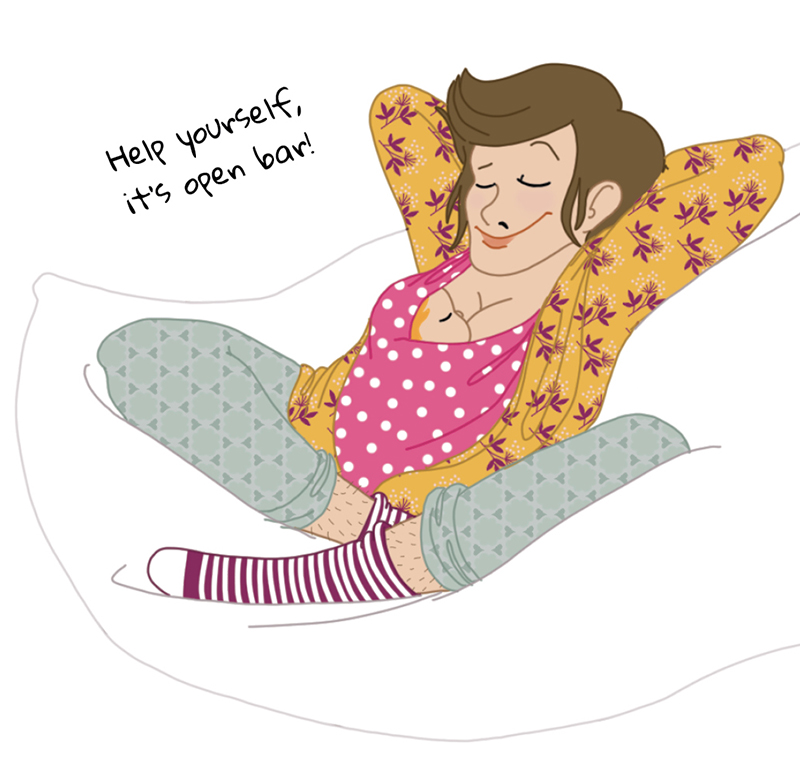It isn’t always simple trying to figure out why Baby is crying or acting in a certain way. For some, the maternal instinct enables mothers to instantly understand their child’s needs… In reality, it isn’t always that obvious.
A stiff neck?
Baby may simply have a torticollis due to a complicated pregnancy, a tool misused during childbirth, or maybe they moved a little too much during labour. All of these events could result in Baby’s neck being stuck and prevent them from feeding. Seeing an osteopath or a chiropractor should quickly sort this out.
A tongue problem?
The tongue is the key to good sucking. A misalignment or malformation can pose quite a few problems… and cause a lot of pain. Whatever the reason for Baby’s difficulty when positioning their tongue, and however distressing it may be, keep calm and don’t hesitate to ask for help.
While you wait to find the origin of the problem, don’t forget to express your milk to stimulate lactation.
Baby puts their tongue above the nipple.
No milk comes out, your nipples get damaged, it is impossible to feed them. In this situation, nipple confusion is usually the culprit. A few sessions of physiotherapy will quickly resolve the problem.
Poor extrusion reflex
Baby pushes everything out of their mouth, including your breast?
Tension in the jaw may be the cause, thus hindering Baby’s primitive reflexes. An extremely rare neurological problem may be the reason. See a chiropractor or osteopath who will tell you what to do next. In the meantime, you can help Baby open their mouth and position their tongue by pressing on their chin while showing them your tongue. Baby should end up getting the message.
Tongue and lip ties
This problem is not always well-known to the medical profession.
Yet frenula are present in all mouths and are of great importance in breastfeeding, swallowing and pronunciation, and can as well as being a source of tension. If Baby can neither pull their tongue out nor lift it up (it can also be heart-shaped or tubular), an assessment of the tongue muscles will help to see if any of them are restrictive: too tight a tie on the tongue or upper lip can prevent a good latch on the nipple (Baby squeezes the jaw too tightly) and, therefore, good drainage of the breast.
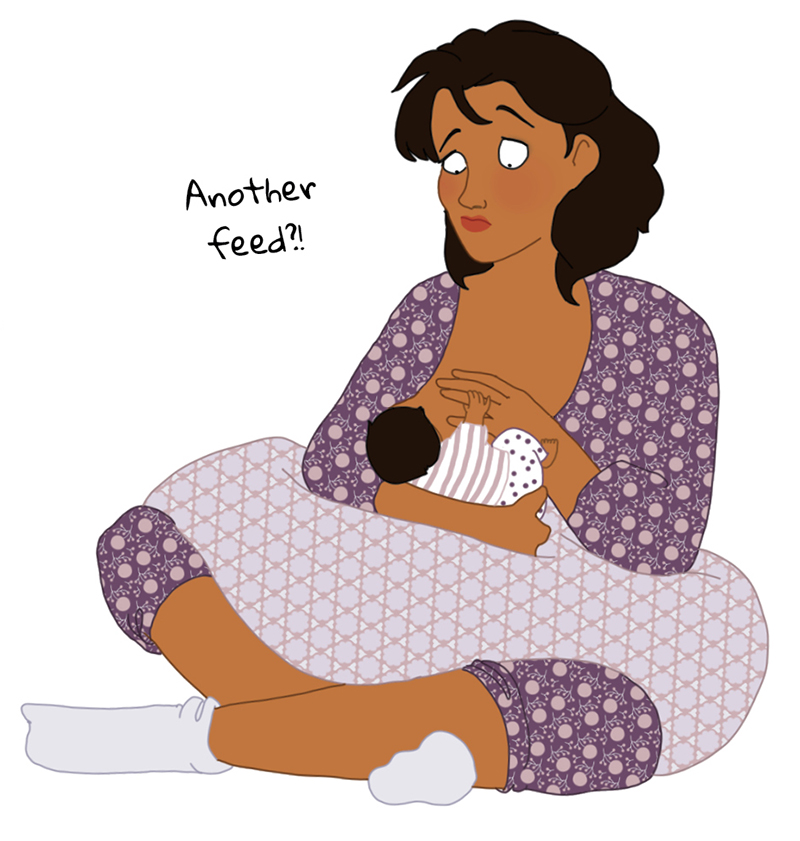 Here are a few things that should give you a heads-up:
Here are a few things that should give you a heads-up:
- Baby pinches your nipple,
- Their tongue « clicks » when they stop sucking suddenly,
- Baby feeds constantly but never seems full,
- Spaced apart feeds,
- Baby gags while feeding,
- Baby gets frustrated and refuses your breast,
- Their chin trembles and their cheeks are sucked inwards.
Be careful: if Baby only has one of these symptoms they may not have tongue tie. If you experience all of these difficulties, seek help from a professional.
In addition to these inconveniences, a host of complications can be expected:
For Baby
- Difficulty latching
- Lip blisters
- Reflux
- Thrush
- Difficulty gaining weight (or a sudden halt in weight gain that was perfect before)
- Torticollis
For you
- Painful feeds
- Cracked nipples
- Engorgement and mastitis
- Clogged ducts
- Decreased lactation
- Candidiasis…
If a frenectomy is planned, you must ensure that Baby is seen by various specialists: chiropractors, osteopaths, lactation consultants and paediatricians who will all be a great help. They will show you the exercises and massages that will relieve tension and/or prepare the jaw for a possible operation.
Although this surgical procedure is relatively simple, it isn’t always easy to organise for several reasons. ENT specialists and dentists are usually not too keen on taking their scalpel to Baby’s mouth, for them there is a much easier solution: weaning! You may have to be insistent and persevere in order to find someone to take care of it. Bear in mind that lip and tongue ties are just as common in babies as they are in adults.
Once the frenectomy is over, given that the tongue is a set of muscles, prior tension issues may have had an impact on the muscles of the face and neck. It will be necessary to ease these tensions and show the tongue what it is capable of. Also ask the medical team involved with the procedure which gestures and techniques will help with healing. Wounds in the mouth tend to close up very quickly without warning. Baby may, therefore, end up with a tie as tight as before, so it is important to follow up on and accompany the operation. Massaging and stretching are indispensable during the following weeks.
Surgery: Check. Healing: Check. Now, together with your lactation consultant, you just need to make sure breastfeeding goes smoothly for you. They will give you customised, expert advice to ensure a successful experience.
These three stages are essential! If you skip one of them you may not get the results needed to continue breastfeeding happily!
Cleft lip and palate
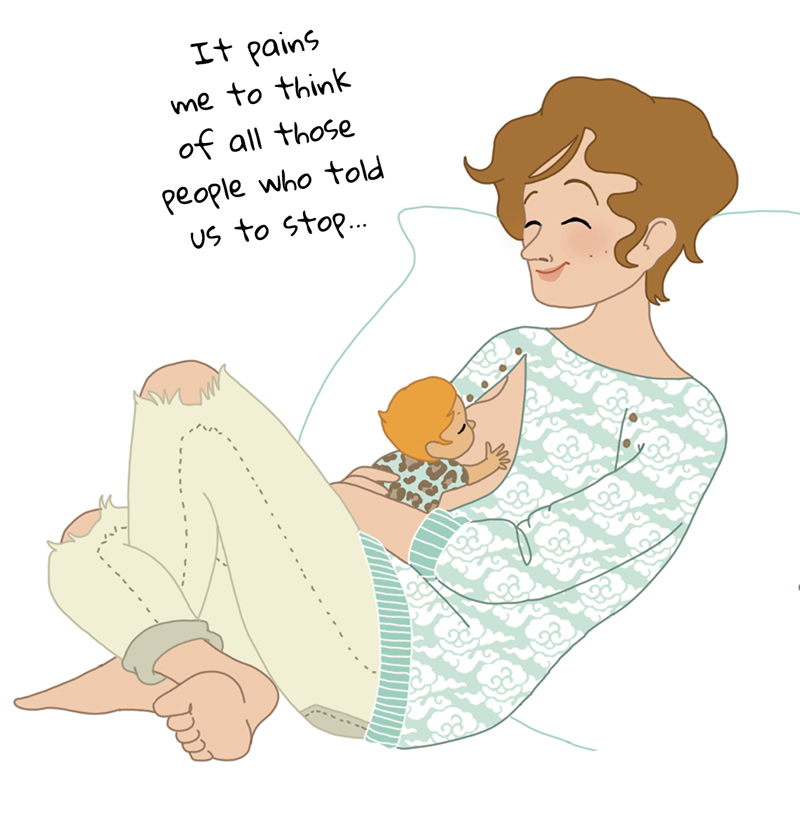
This condition is not uncommon and can be more noticeable for some. If it is detected, try to keep your spirits up and be patient, surgery will correct it. In the meantime, it may be hard for Baby to feed directly from the breast. But do not give up on the idea of breastfeeding, it can have some great benefits:
- It will develop Baby’s orofacial muscles.
- Reduce risk of infection. Your milk will protect Baby during surgery and against any ear, nose and throat infections.
- Breastfeeding hormones will boost your spirits and help you bond with Baby, which is a detail that could really help you during these troubling moments.
Let’s be honest: Baby is going to need your help when feeding and the help of a lactation consultant will probably be useful during the early stages.
You can help Baby suckle better by choosing the upright (koala) or rugby hold, and by positioning their lips as best possible with your fingers. This will help the milk go down the right way.
If they can’t latch on, choose a small rubber spoon or a Haberman bottle (filled with your milk, of course).
If their nose fills up with milk, it’s not a problem! It will all be assimilated, and clean itself up. Some mums even use their breast milk to help when Baby has a runny nose!
Biting!

Some may tell you that Baby bites as soon as their first tooth comes in. A foolish comment since one cannot suckle and bite simultaneously. Their tongue covers the lower teeth, and the nipple, placed deep in their mouth and directed towards the palate, prevents the upper teeth from biting down. If they bite, they aren’t feeding!
This can happen for several reasons: they fall asleep on your breast and their jaws close, they want to grab your attention (no more screen time or other occupations during the feed), or they are playing, seeing you jump to the ceiling at the previous bite amused them, they want more.
No need to shout though. Some babies may get scared if you shout and go on a nursing strike (we discuss this on the following pages). Explain to them that biting hurts, firmly state your objection and offer them something to chew on instead, they will understand that your nipple is not a teething toy.
If Baby bites, slip your finger in between their jaws to help them let go. Do not pull your breast away suddenly, this will upset them.
Is Baby irritable?
Are their gums tightly sealed?
Baby may at times give you the impression that they think your breast is an antistress ball. This, thankfully, isn’t actually the case, it is a reflex just like the sucking reflex that will pass with time. Maybe Baby cannot open their mouth wide enough. In this case, you should see a chiropractor or an osteopath to try to rid Baby of any muscle tension issues.
Massaging Baby during bath time will be helpful. If they « bite » you during a feed, press down on their chin to ensure their tongue is covering their lower gum, and they should stop.
Hypertonic?
Do you feel like Baby is always tense? Baby won’t stay still, quickly lets go of your breast and can’t tolerate any contact with the soles of their feet? There is a good chance Baby is hypertonic. Breastfeeding using the rugby position and swaddling should help you cope with this situation!
Weak suckling?
The first thing you need to ask yourself: has Baby drunk a bottle recently, could this be nipple confusion? If that isn’t the case, here are some other possibilities:
Drowsy?
Was Baby born earlier than expected or affected by the epidural (this can happen)? Keep them nice and close, practising skin-on-skin contact as often as possible (BN is ideal), with their head near your breast and let them feed whenever they want. Even the slightest sip will be appreciated. Things should get back to normal eventually.
Hypotonic?
Some babies with low muscle tone cannot keep the nipple in their mouth. A neurological problem, such as Down’s syndrome, could be the cause. While waiting for your paediatrician to tell you more, choose a position that will allow you to accompany Baby during the feed. Like the cross-cradle hold, for example.
In general, these children will be more closely monitored early on in life to ensure that they are suckling properly. You may need to express your milk to maintain lactation. Do not hesitate to bring this up with the lactation specialist at the maternity ward.
Nursing strike
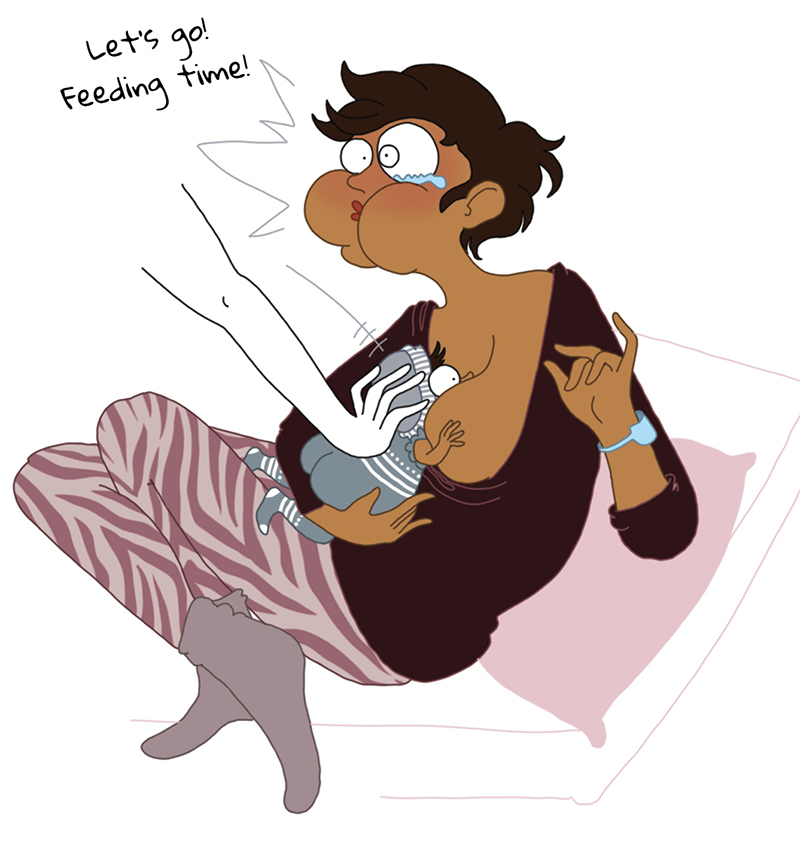
Sometimes Baby will just stop breastfeeding for no good reason. This refusal can leave some mothers feeling overwhelmed. Fortunately, there is nothing mysterious about these strikes, they can occur for several reasons:
- If it is a newborn, they may be bothered by a medical procedure that took place during birth or be affected by the epidural. Baby may have been forced onto your breast, which could traumatise them.
- If Baby is just a few days old, and was given a bottle, nipple confusion could be the culprit. OALD or overproducing milk could also be the cause. Do not hesitate to bring this up with the lactation specialist at the maternity ward.
- If they are older, other causes should be considered: psychomotor learning (they discover the world and have other things to do than eat), illness (even a cold), the taste of milk, a new mother’s deodorant, a lousy environment at home, etc. It is, therefore, important in the event of a strike to analyse your daily life to identify the source of the problem.
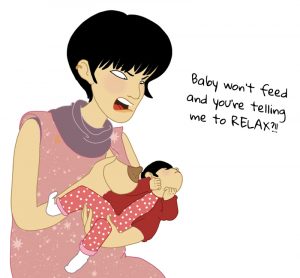
The miracle ingredient in this case is patience, patience… and more patience!
Do not force Baby, this could worsen the problem. Try to relax: changing positions, walking while feeding, doing as much skin-to-skin contact as possible, in order to reconcile Baby with the idea of breastfeeding. Rock them, reassure them, let them feed whenever they wake up or start to nod off.
This kind of strike, which can last a few days, usually resolves itself. While waiting for them to feed at the breast like before, you can try to breastfeed when they are drowsy, give them a cup, bottle, pipette, or splash a few drops of milk on their lips.
During a strike, don’t forget to express your milk to stimulate lactation and avoid engorgement!
GERD

Does Baby often regurgitate? Sleep poorly? Cries incessantly and seems inconsolable between meals? Is agitated during feeds (constantly demanding to be fed or, on the contrary, refuses to feed)? There is a good chance Baby is suffering from Gastroesophageal Reflux Disease.
GERD, or reflux, usually arises because the junction between the stomach and oesophagus is not yet fully developed. To put it simply: milk rises up the gullet containing gastric acid and can come out through the mouth or even the nose. To say it must be unpleasant would be an understatement.
Be careful, reflux is not always visible and can remain « inside ». This makes it even more difficult to diagnose.
If this is the case (although it is rare), the problem can become a real nuisance. It is always necessary to closely monitor a baby who suffers from GERD. If they do not grow enough, have frequent ear, nose and throat infections, spit blood or lose consciousness, head to the doctor’s immediately.
Solution
Despite what many doctors may say, breast milk is ideal for babies suffering from reflux. Breast milk is quickly assimilated and passes into the stomach rapidly, avoiding reflux. Furthermore, it is a product of 100% human origin and there is less chance of Baby coughing up breast milk up. There’s no need to add a thickener: studies have shown that it doesn’t make any difference and can even makes things worse. A medical treatment can be avoided if the reflux isn’t too severe. Here are few little tips to help you get through these tough times:
Head held up high
Choose positions where Baby suckles vertically and use your baby wrap (without too much pressure on the tummy) as often as possible. If you enjoy after-dinner strolls, go on a little walk with Baby if they look like they are in pain. Raising the upper end of their mattress slightly can also help.
Still hungry?
Feeding can relieve pain. Let Baby feed as soon as they get agitated. Use your least full breast: they may only need to suckle to relax. If they fuss, they’re hungry: change sides, for the fuller breast. If, they refuse to feed, try to walk with Baby to sooth them. They will feed when they feel hungry.
No milk today
CMPA (Cow’s Milk Protein Allergy) could also be the cause of reflux, or worsen it. If this is the case, you’ll need to drastically change your eating habits to rid your milk of any traces. You can talk to your doctor, allergist or nutritionist to understand the ins and outs of this type of diet.
You may need time to get used to it. Setting aside cow’s milk and/or the cheeses made from it usually isn’t enough. You can find cow’s milk protein in a lot of foods. Beware of industrial products; CMPs have pretty names such as albumin, galactose, lactose, globulin, animal proteins, E270, E325, E326, E327, etc. It is very difficult to eliminate them, they can be found in many foods, including some hams! The same applies for drugs in which lactose is often used as an excipient.
Burps all around
Take the occasional burp break during feeds. The less air Baby swallows, the better the feed will be and this will lessen reflux.
These excerpts are from My completely illustrated Breastfeeding Book.


